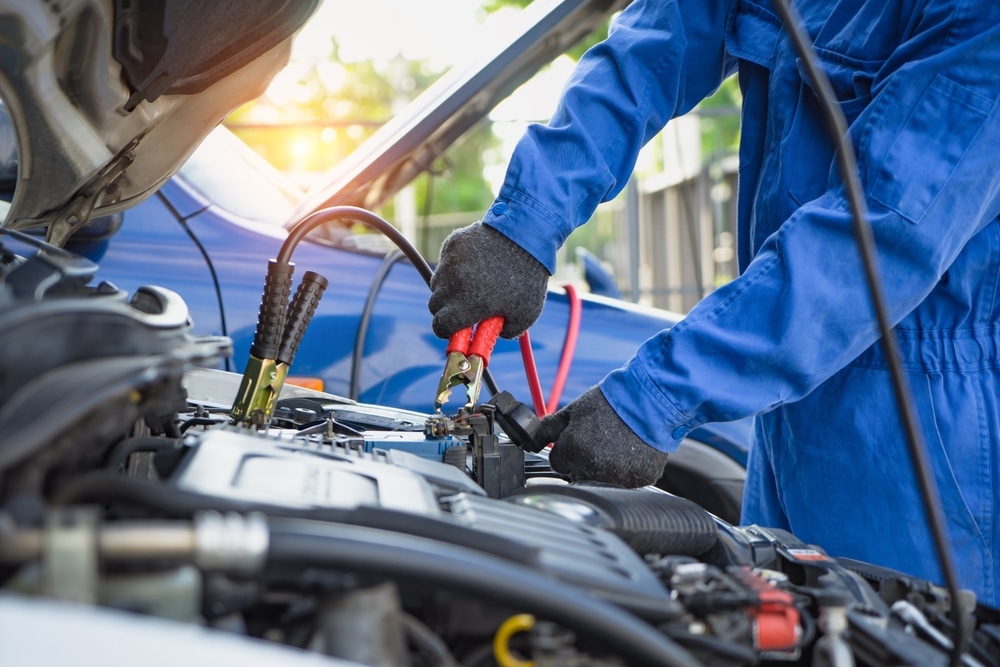Table of Contents
If your car battery keeps dying, it can be both frustrating and inconvenient. While a one-time battery drain might not be a major concern, frequent occurrences can indicate a deeper problem. Whether it’s an aging battery, electrical issues, or user habits, understanding the causes and solutions will help you prevent future battery failures. Numerous variables can contribute to a car battery dying regularly; addressing these issues can stop the problem from happening again. The following are some typical causes of continuous car battery death, along with fixes and advice on how to avoid them:
Common Reasons Your Car Battery Keeps Dying

1. Leaving Lights or Accessories On
One of the most common causes of a dead battery is accidentally leaving the headlights, interior lights, or other electronic devices on after turning off the car. Even small accessories like phone chargers can drain your battery over time.
🔧 Solution: Always double-check that all lights and accessories are turned off before exiting your vehicle. Many modern cars have automatic shut-off features, but older models may not.
2. Parasitic Drain
A parasitic drain occurs when an electrical component continues to use power even when the car is off. Common culprits include faulty alarm systems, malfunctioning trunk lights, or power seats/windows drawing current when they shouldn’t.
🔧 Solution: Use a multimeter to test for abnormal power draw. If you suspect a parasitic drain, have a professional diagnose and fix the issue.
3. Corroded or Loose Battery Connections
If your battery terminals are dirty, loose, or corroded, your car may struggle to start or lose power intermittently.
🔧 Solution: Check the battery terminals and clean any corrosion using a mixture of baking soda and water. Tighten any loose connections to ensure a secure electrical flow.
4. Weak or Old Battery
Car batteries typically last 3-5 years. If your battery is nearing the end of its lifespan, it may no longer hold a charge effectively.
🔧 Solution: Test your battery’s voltage with a multimeter. If it’s below 12.4 volts, consider replacing it.
5. Extreme Weather Conditions
Both hot and cold temperatures can affect battery performance. Cold weather can slow down the chemical reactions inside the battery, while excessive heat can cause fluid evaporation and internal damage.
🔧 Solution: If you live in an area with extreme temperatures, consider using an insulated battery blanket in winter or parking in a shaded area during summer.
6. Faulty Alternator
The alternator is responsible for recharging your battery while the car is running. If it’s malfunctioning, your battery won’t receive the necessary charge, leading to repeated dead battery issues.
🔧 Solution: If your battery keeps dying despite driving frequently, have your alternator tested by a mechanic. Look out for dimming headlights or warning lights on your dashboard.
7. Frequent Short Trips
Short trips (under 10-15 minutes) don’t allow your alternator enough time to recharge the battery fully. Over time, this leads to insufficient charge levels.
🔧 Solution: Take longer drives or use a battery trickle charger to maintain proper charge levels.
8. Defective Charging System
Even if your alternator is functional, a faulty charging system (such as a broken voltage regulator or wiring issues) can prevent your battery from charging correctly.
🔧 Solution: Have your car’s charging system inspected by a professional to ensure everything is working properly.
How to Prevent Your Car Battery from Dying

Taking proactive steps can extend the life of your battery and reduce the chances of unexpected failure.
✔ Turn off all lights and accessories before exiting your vehicle.
✔ Clean and inspect battery terminals regularly to prevent corrosion.
✔ Drive your car frequently to maintain a full charge.
✔ Test your battery and alternator annually, especially before winter.
✔ Avoid excessive short trips that don’t allow the battery to recharge.
✔ Check for parasitic drains if your battery dies often.
✔ Replace an old battery before it fails.
When to Replace Your Car Battery
If your battery is over three years old, you should test it regularly. Replace it if you notice:
🔴 Frequent jump-starts required
🔴 Slow engine cranking
🔴 Dim lights or electrical malfunctions
🔴 A swollen battery case
A weak battery can also strain other components, leading to costly repairs.
Final Thoughts
A car battery that keeps dying is a warning sign of an underlying problem. Whether it’s a faulty alternator, electrical drain, or an aging battery, identifying the cause and taking preventive steps will keep your car running smoothly. Regular maintenance, timely battery replacements, and proper charging habits will help you avoid breakdowns and costly repairs in the long run. 🚗🔋
